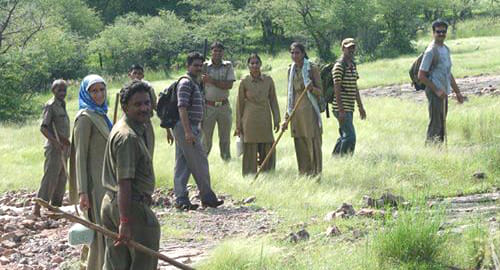New Delhi: The 90-minute-long stare-down between a forest guard and a tiger at the Satpura reserve in Madhya Pradesh has once again brought to the fore the perilous lives of the country’s green soldiers who patrol expansive and dense forests — often at extreme personal risk, and little or no recognition.
Earlier this week, Sudha Dhurve, a forest guard in MP’s Satpura Tiger Reserve in Hoshingabad, had a frightening encounter with a tiger during an animal census at the reserve. Dhurve, who was accompanied by two other male colleagues, stood at a distance of less than 10 metres from the big cat for nearly one-and-a-half hours.
According to reports, Dhurve was sure that if she or her colleagues moved, the tiger, which was already roaring at the trio, would attack. She instructed her colleagues not to move an inch.
The trio eventually tired the tiger out, which ran away into the jungle after the face-off.
“Initially I was so scared that I forgot all the lessons of my training, but when I gathered myself, I looked into the tiger’s eyes… We knew if we move, we will be dead,” Dhurve was reported to have said.
Dhurve will be felicitated by the state forest department on 26 January for showing exemplary courage.
‘Routine work’
For the field staff working in India’s forest departments, mitigating the kind of danger that Dhurve did is part of the daily job.
“We applaud her for her courage, and are going to felicitate her, but this is really nothing special for us, it’s our job,” said S.K. Singh, field director of the tiger reserve.
“She saved not just her life but that of two other people, so it is commendable, but having said that, it is routine work,” he added.
Singh said this was not a job for the faint-hearted. “It is true that the field staff has limited protection once they are in the jungle — we often have rudimentary equipment,” he said.
He said that field staff don’t get to see their families — sometimes for weeks and months — while living in shelters without basic amenities like power or drinking water.
Staying away from home and the dangers of the job — from forest fires and man-animal conflicts, to combating illegal activity and encountering wild animals on a daily basis — leaves several of them demoralised, Singh added.
Also read:The woman forest guard who stared a tiger down for 90 minutes, and lived to tell the tale
No recognition
An Indian Forest Service (IFS) officer, who did not want to be named, said there was little recognition for the field staff.
“The field staff are like the soldiers of the jungles, but work without any recognition whatsoever,” the officer said, adding, “It is not like a 9-5 job… Even if there is a problem in the forest at 1 am, you have to get up and go… But because they are working in the jungles, nobody knows them or appreciates their work.”
As a result, young people are less inclined to be recruited as forest staff. Little recognition, coupled with low pay, is an obvious disincentive.
Moreover, to be recruited as a forest guard, one needs a high level of technical education — B.Sc. or M.Sc — in several states, but the positions are not gazetted.
“On the one hand you want such high degree of expertise, and on the other the positions are not even gazetted… So who would want to join?” the officer pointed out.
Inordinately understaffed
Governments seem happy to rely on contracted staff. They are cheaper, and cost between Rs 6,000-Rs 10,000 a month.
According to data available with the Wildlife Trust of India, the vacancies in the tiger reserves are crippling.
The Palamau reserve in Jharkhand has a 70 per cent vacancy of formal staff. The Dampa reserve in Mizoram is a close second with a 69 per cent vacancy. Indravati reserve in Chhattisgarh, Udhagamandalam and Anamalai reserves in Tamil Nadu and Sanjay-Dubri reserve in MP all have a vacancy of more than 40 per cent. The famous Corbett reserve in Uttarakhand doesn’t fare any better, with a 40.48 per cent vacancy.
“The government is not recruiting younger people, so the force is really ageing in one sense… But this is not work that old people can do,” said another IFS officer, not wishing to be named.
“You have to be alert, you have to be physically strong and willing to take risks all the time… The forest staff can do it, but some recognition wouldn’t harm.”
Also read: Killing Avni: Trigger-happy solution or failure of India’s tiger conservation policy?






